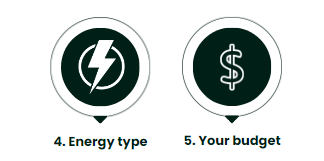Solutions For Comfort: Boilers
In Ottawa, staying warmer during the frigid winter month just got easier.
We rely on our home’s heating equipment in the colder months to keep us comfortable. This article will explore how boilers work and the major factors to consider when purchasing one for your home.
Understanding how boilers work
-
Fuel Supply: It uses fuel like natural gas, oil, or electricity, which is the energy it needs to heat the water.
-
Heating the Water: Inside, there is a place where the fuel burns, making a lot of heat. This heat warms up the water in the boiler.
-
Heat Exchanger: The boiler has a special part called a heat exchanger. This part helps transfer the heat from the burning fuel to the water, making it hot quickly.
-
Circulating Hot Water: The hot water travels through pipes in your house. These pipes go to radiators (which are like big warm panels) or under the floor, spreading warmth to all the rooms.
-
Control Systems: It has a control system, like a brain, that tells it when to start and stop heating. This keeps the water at the right temperature.
-
Exhaust System: When the fuel burns, it creates gases. It has a pipe, like a chimney, that safely carries these gases outside.
Choosing the right boiler for your home needs: Factors to consider

-
Type: Depending on your home needs:
- Combi Boilers: Best for small homes, no need for extra tanks.
- System Boilers: Good for homes with multiple bathrooms, need a hot water tank.
- Conventional Boilers: Ideal for larger homes that need both hot and cold water tanks.
- Condensing Boilers: More efficient, can be any type (combi, system, or conventional).

-
Energy type: They can run on natural gas, oil, electricity, or propane. Choose a fuel type that is readily available and cost-effective. Natural gas is common and may be the most cost-effective option in Ottawa.
-
Your budget: The cost of a boiler can vary depending on the type, model and installation needed to support your home's characteristics and size.
